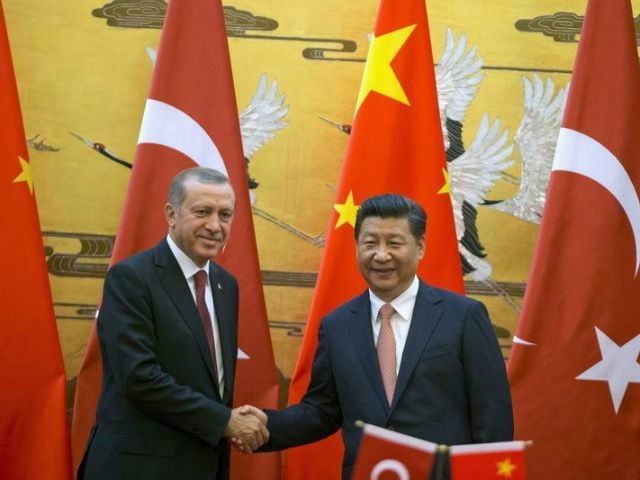Turkish President Recep Tayyip Erdogan is currently in Beijing, where he met with President Xi Jinping on Wednesday and called for the expansion of bilateral trade. While Chinese state media attempted to make trade the center of the meeting, the international community watched for signs of tension between the two nations given Turkey’s support of China’s Uyghur minority.
“At present, we are moving in a constructive direction, bringing more content to our strategic cooperative relationship,” Erdogan reportedly told Xi at Beijing’s Great Hall of the People, where he was welcomed. Chinese state media note that the two discussed economics, particular a missile defense program Turkey is hoping for China to help them build. Of that program, state outlet Xinhua quotes Erdogan as stating that some “impediments” have stalled development, but that both nations are looking to move forward on it. “Any offer that will enrich this appropriate proposal will be welcomed by us,” he stated.
Turkey has a renewed interest in boosting its defense as it began an assault in Syria last week, ostensibly aimed at weakening the Islamic State terrorist group but in practice more focused on weakening the Kurdistan Workers’ Party (PKK), a Marxist terror group. While the PKK and China share in the same ideology, a Xinhua column published Thursday condemns the separatists within the PKK or threatening to “drown Turkey into a quagmire of chaos,” justifying Turkish attacks on the group.
In a sign that Turkey is equally concerned about separatist groups hurting the stability of the country and looking for Chinese support, China’s state-run CCTV quotes Erdogan as categorically opposing the East Turkestan Islamic Movement (ETIM), a Uyghur separatist group operating in Western China. “Turkey is opposed to East Turkestan Islamic Movement (ETIM) attacks against China. Turkey will not allow extremist and terrorist groups to affect relations with China,” he is quoting as saying.
These comments are in stark contrast to Erdogan’s previous statements on Uyghurs. Erdogan has gone as far as accusing China of “genocide” against the Uyghur minority in the past. The Uyghurs are ethnically a Turkic people and seen by many Turkish nationalists as kin.
Chinese state media wasted no time addressing the Uyghur issue, even if Chinese officials themselves have not yet done so. Turkish outlet Hurriyet quotes a China Daily column as warning that the “Uighur issue … if left unattended, may poison ties and derail cooperation.” Xinhua accused Turkish media of making “quite irresponsible and baseless reports on so-called interference by Chinese authorities in Ramadan and other religious activities in China, resulting in violence against the Chinese embassy and tourists in Turkey.”
Turkish media did report on ordinances passed in mostly-Muslim Xinjiang, China, where party officials were banned from fasting for Ramadan and public fasting was banned. Businesses have also been forced to sell alcohol and cigarettes–both forbidden by Islam–and both the burqa and general “Islamic garb” have been banned from public transportation.
The Turkish government issued a statement expressing “deep concern” for Uyghurs in China following these reports, triggering protests in Turkey against the Chinese (and some unlucky Korean tourists mistaken for Chinese).
China, meanwhile, has been accusing local Turkish embassies of helping Chinese Uyghurs illegally escape China. Embassies have allegedly been telling Uyghur Chinese nationals to claim to be Turkish citizens when fleeing to a foreign country, and the Turkish government will vouch for them. Some Chinese outlets have even reported that Turkish embassies have listed the Uyghurs’ nation on official paperwork not as China, but “East Turkestan,” the separatist name for the region including Xinjiang.
At least one Chinese official has limited criticism to local Turkish outlets, not Erdogan’s government: “The general attitude of the Turkish government has been not bad … but what we have seen is that employees at Turkish embassies have been providing help.”

COMMENTS
Please let us know if you're having issues with commenting.